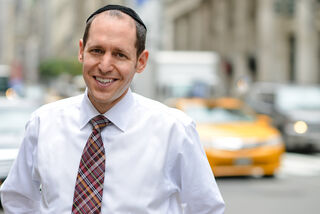Spirituality
Unlocking Inner Peace When the World Is on Fire
The importance of spirituality amid stress.
Posted July 8, 2020 Reviewed by Gary Drevitch

Guest post by David H. Rosmarin, Ph.D., ABPP
The current era—with all its tumult and confusion—has ironically created an unparalleled opportunity to cultivate inner peace.
Stigma and shame are at an all-time low since it is now perfectly acceptable and even expected to struggle. This is hugely impactful because, as we know from systematic research, stigma is a primary contributor to the severity and impact of emotional distress. Simply put: There is nothing worse when you’re depressed or anxious than to be ashamed of feeling distressed, and today we finally herald “It’s okay to not be okay.”
Along these lines, federal entities such as the Center for Disease Control, National Institute of Mental Health, and the Substance Abuse & Mental Health Services Administration have all taken a clear stance in recognizing that mental distress can have just as much (if not more) impact than physical illness. Similarly, the American Psychiatric Association, American Psychological Association, Anxiety & Depression Association of America, and other national organizations have tirelessly educated the public about the importance of self-care, the benefits/drawbacks of technology use, and the mental health value of mindfulness and meditation.
However, our general approach to mental health as a nation tends to be reactive, as opposed to proactive. We are focused on stemming the tide of distress, instead of promoting emotional wellness. Our approach has been fruitful, but we are missing the mark. As a result, psychological distress continues to rise. Despite our decreased stigma and greater outreach about one-fifth of American adults have an anxiety disorder in each and every year, and two-fifths suffer from significant anxiety over the lifespan. In a recent survey by the American Psychiatric Association, more than one-third of Americans said that COVID-19 was seriously impacting their mental health, and there is evidence that alcohol/substance misuse and domestic abuse are on the rise.
One proactive approach to mental health involves spirituality. To be clear, many non-religious individuals access spirituality since this domain simply involves the perception that there is a reality greater than the material world (whether linked to religious systems, or not). Although this domain is underutilized by mainstream psychiatry and psychology, the spiritual world has much to offer. Most mental health patients wish to address spiritual issues in their treatment, and the vast majority within the general public harness spiritual resources when coping with traumatic events.
Needless to say, not all aspects of spirituality are for everyone. Some concepts and activities resonate, and others do not. Furthermore, attending to spirituality without self-care or connection with others (or professional treatment, if needed) can be counterproductive and even dangerous. Nevertheless, the following spiritual concepts and activities may be helpful to those who wish to cultivate more inner peace during challenging times.
First, the very notion of “inner peace” implies that human beings have the potential for peace inside, and more broadly that our most precious life assets are internal. All five major world religions speak about the Soul—a supernal part of each human that cannot be measured, but its presence can be experienced. The concept of the Soul implies that human beings are not simply physical but have spiritual elements as well. Thus, moments of solitude, yoga, or mindfulness practices can create moments of quietude in which our body and soul can connect.
A second spiritual idea is that all human beings are connected, not only socially but spiritually. Many faith traditions believe that others are brought into our lives for a spiritual purpose. Sometimes this is readily apparent, and in other instances, it takes time to recognize. As such, it can be worthwhile to consider and contemplate that loved ones, friends, acquaintances, or even strangers are present for a reason.
Another spiritual concept is meaning-making, in which we transcend the vicissitudes of life circumstances and seek to find higher-order purpose or ultimate value. One particularly poignant meaning-making strategy is to focus on the concept of free will by recognizing that human beings always have the freedom to choose and change. Even envisioning a brighter future can be a form of meaning-making since temporary struggle or suffering is much easier to tolerate when it is perceived to lead to an ultimate good.
Perhaps the most powerful spiritual concept vis-à-vis our emotional health is that of radical acceptance. This entails accepting life on life’s terms (as opposed to our own) and not fighting against that which we cannot change. From a spiritual perspective, the vast majority of human experiences are beyond our control. We don’t choose our parents, our socioeconomic circumstances, our physical or mental abilities, or even the geographic location and time period into which we are born. Consider as well that medical research is far accelerated during epidemics, international diplomacy shines brightest when there is a threat of war, and sweeping social changes are often preceded, if not preempted, by strife and unrest. Yet, none of these innovations are possible without first accepting the yoke that each challenge presents. Radical acceptance is therefore a firm foundation for inner peace since it enables us to see past immediate struggles and focus on new vistas on the horizon.
To these ends, it is precisely during tumultuous times—when the world is on fire!—that we have the best opportunities to cultivate inner peace since it is so abundantly clear how little is within our control.

David H. Rosmarin, PhD, ABPP is an assistant professor in the department of psychiatry at Harvard Medical School and the director of the Spirituality & Mental Health Program at McLean Hospital. His research and clinical work have been featured in Scientific American, the Boston Globe, the Wall Street Journal, and the New York Times. This article was adapted from a recent McLean Hospital/Harvard Medical School webinar.




